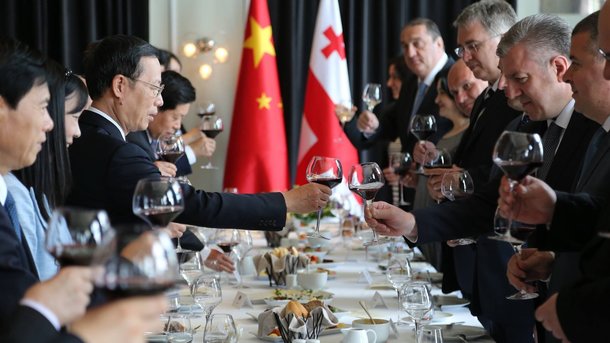Georgia's Economy Minister Giorgi Gakharia and China's Commerce Minister Zhong Shan signed the long-awaited free trade agreement. The Memorandum on the parties' intention to prepare such an agreement was signed in 2015 during the former Economy Minister Giorgi Kvirikashvili's visit to China, who today holds the post of Prime Minister. Within two years, Beijing and Tbilisi have harmonized each provision of the document.
The agreement provides for the abolition of customs duties for 94% of goods exported from Georgia to China. High-ranking officials and leaders of the Georgian Dream ruling party describe the agreement 'historical', claiming that opening a half-billion-dollar market for Georgian products will become a powerful stimulus for its economy. "We are entering a completely new level," Giorgi Gakharia said immediately after signing the agreement. According to the minister, the export from Georgia to China "is constantly growing." Therefore, the signing of the agreement "was an imperative and meets the interests of both states." The most noteworthy in the minister's statement was the phrase about the regional importance of the agreement between China and Georgia: "We are working to make Georgia a platform for international trade," the minister stressed. Immediately questions have been raised about the impact of this process on the economic situation in the South Caucasus, the states of which are still closely related.

Giorgi Gakharia
The concern was expressed by the Chairman of the Parliamentary Branch Economy and Economic Policy Committee, Roman Kakulia. "Such agreements are related not only to bonuses, but also to certain risks," the MP said, clearly referring to the fact that free trade between Georgia and China does not only mean the opening of a huge Chinese market for Georgian goods, but also the opening of Georgia's markets for the flow of Chinese goods. What does it mean for Georgia and neighboring states? The economic expert Giorgi Khukhashvili, speaking to Vestnik Kavkaza in an exclusive interview, drew attention to the fact that no other country in the region signed or even attempted to sign a similar agreement with China. "Does anybody really think that Azerbaijan could not achieve it if it wanted to?" the expert asked. "But Azerbaijan has been pursuing a sound economic policy for many years, protecting its markets. Baku is well aware of the risks associated with the influx of Chinese goods".
Khukhashvili is convinced that China "is trying to turn Georgia into a springboard for trade in the entire Caucasian region," and since the economies of Azerbaijan and Georgia are connected by a multitude of threads, the possible "collapse" of Georgian markets in a number of commodity positions, including in agriculture, "will certainly force its neighbors to take tough measures". "Azerbaijan does not impede the export of products produced in Georgia, but it will certainly put a barrier to re-export, as was the case with re-export of second-hand European cars," the expert stressed.
Georgy Khukhashvili is convinced that Georgia should not expect special bonuses from exports to China, as it "has nothing to offer the Chinese, except wine, but in a miserable amount, since this drink is less popular in the Celestial Empire than in Europe."







